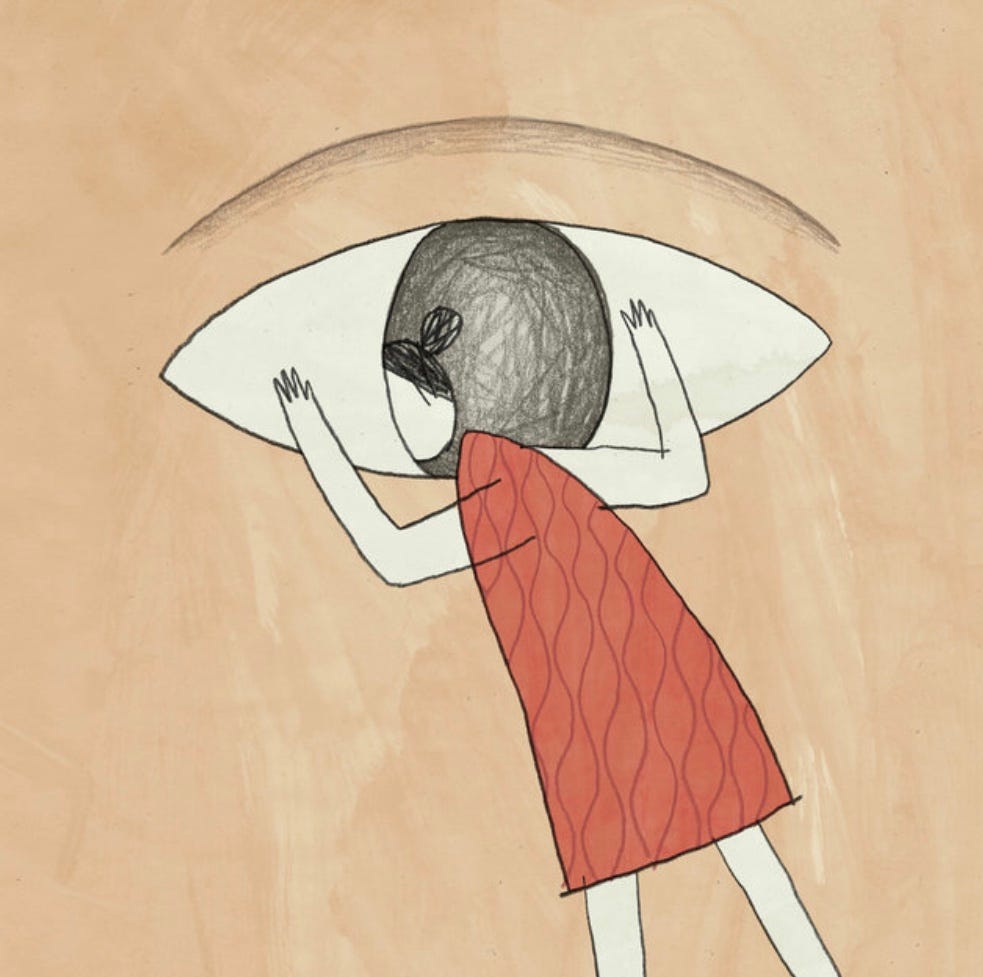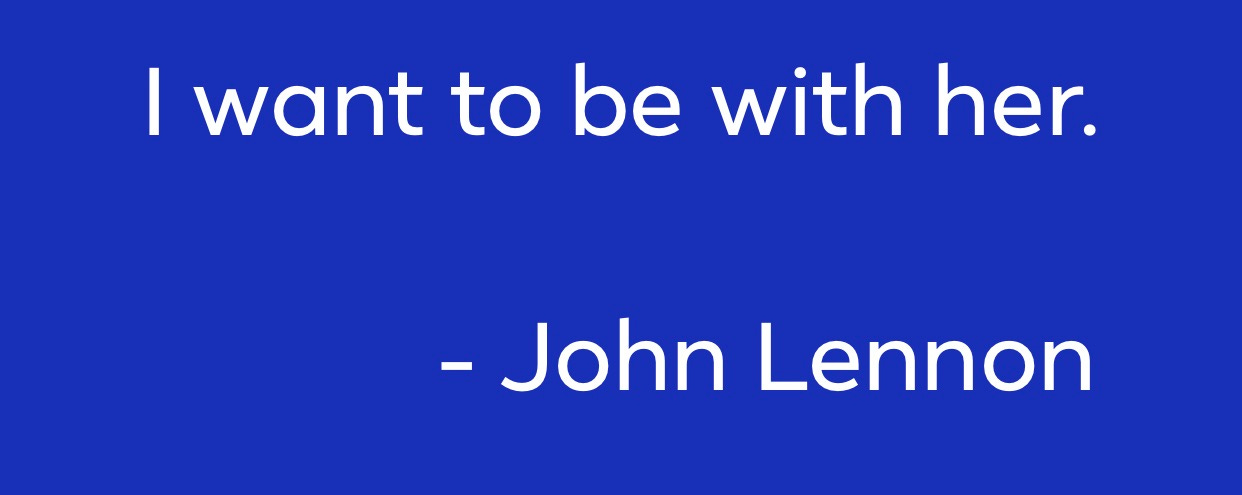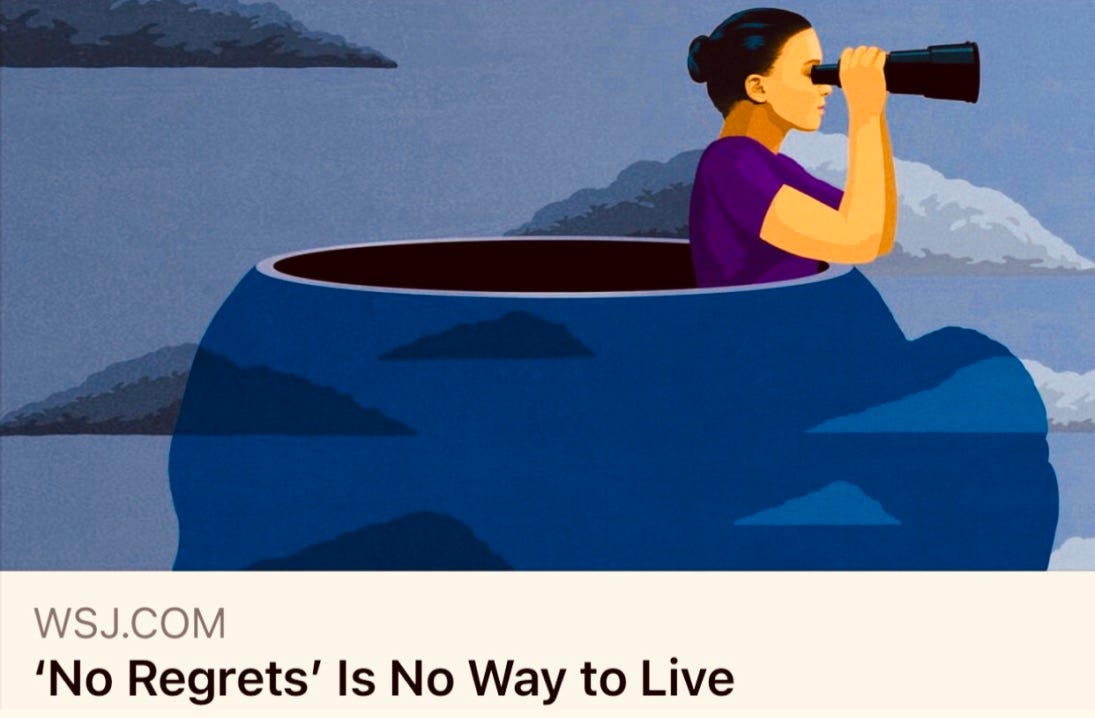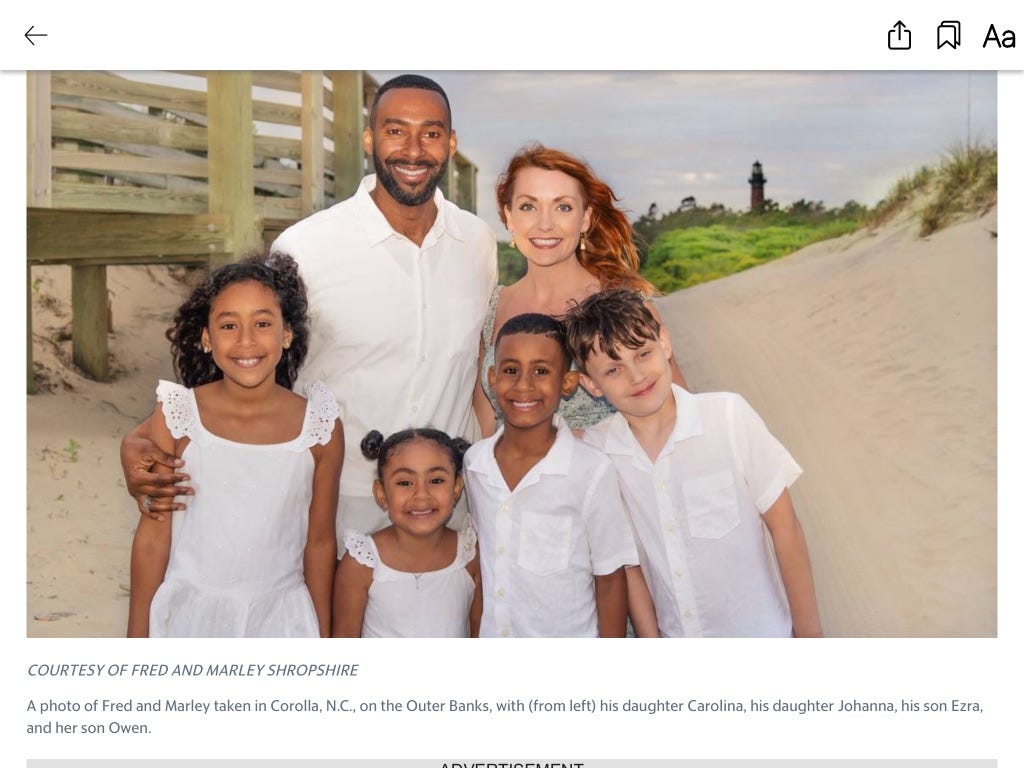Sunday-morning greetings from newShrink, and welcome to your “13-on-the-13th” sampler. It’s a baker’s-dozen mix of light and more complex items around soul/psychological dimensions and our popular culture, after recent weeks’ heavy emphasis on news events and issues.
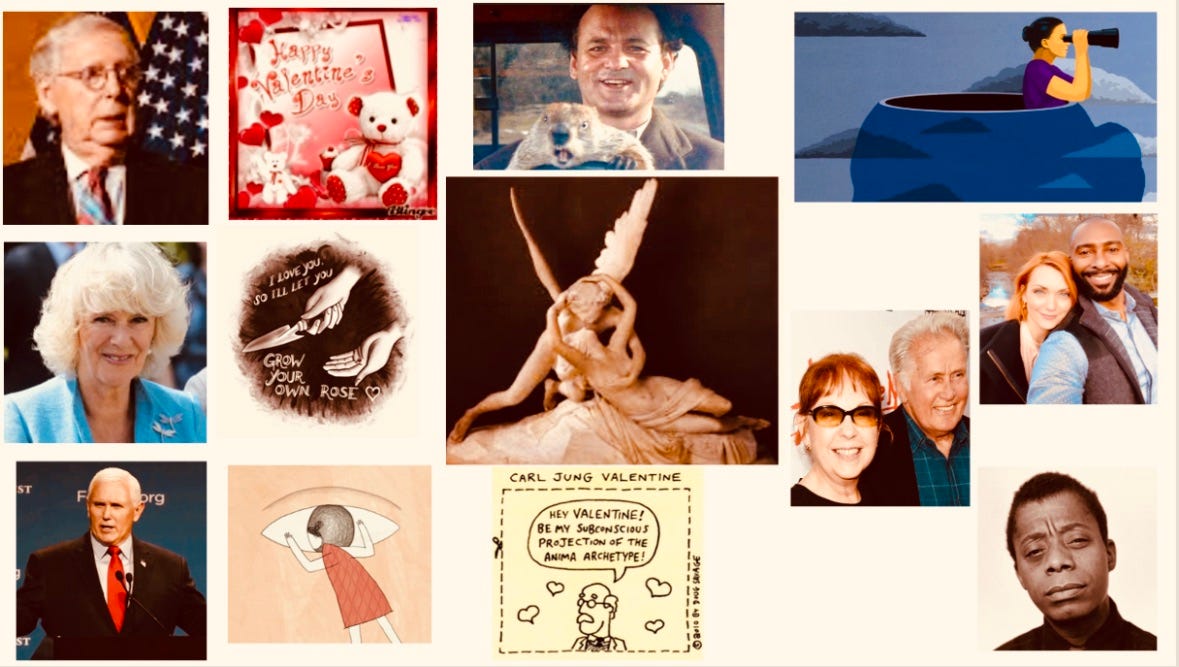
As visually summarized here, today’s themes emerged and arranged themselves as:
🔷 Quirky takes on several kinds of valentines;
🔷 Shadowy-surprise ways the unconscious psyche/soul pulls and expands us, especially through feelings and relationship, into our deeper human complexity; and
🔷 Prospects and examples of the transformative change that comes on the other side of our ordeals and initiations — even, or especially, those we experience like mortal wounds or near-literal hell while we are in them.
For space and Substack-technology reasons, links to items mentioned here are on the website. You can access them by clicking the post here titled Links & Headlines 2.13.22, the couch logo at the top of this email or directly from a browser to newshrink.substack.com.
strange valentines
These first pieces might be read tongue-in-cheek with an imagined subtitle in the spirit of, “who knew?!”
First, for anyone even occasionally following news of the political and world-stage fronts it doesn’t get much stranger than this out-of-character gem from our U.S. Senate Minority Leader who never met a progressive-, Democrat-supported, principled bipartisan — or just right-thing-to-do — effort he won’t happily squash like a bug…
1. “Mitch McConnell: Censuring GOP members is ‘not the job of the RNC’’
(From McClatchyDC.com in The Charlotte Observer)
“Mitch McConnell on Tuesday said it wasn’t the role of the Republican National Committee to penalize GOP members who break with party orthodoxy, following the committee’s formal rebuke of two House members over their role in the investigation of the Jan. 6 riot…
“The issue is whether or not the RNC should be sort of singling out members of our party who may have different views from the majority. That’s not the job of the RNC. Traditionally the view of the national party committees is that we support all members of our party, regardless of their positions on some issues,”
Countering his party committee’s attempt to spin the January 6 Capitol insurrection as “legitimate discourse,”
…”the Kentuckian restated his belief that the 2020 election was legitimate and the attack on the U.S. Capitol on Jan. 6 was ‘a violent insurrection for the purpose of trying to prevent the peaceful transfer of power after a legitimately certified election from one administration to the next.’”
But lest we forget to curb enthusiasm for an uncharacteristic change-of-heart:
“It was a typically tempered response by McConnell that stopped short of expressing outright support for Cheney and Kinzinger, who find themselves in the cross-hairs of former President Donald Trump and his allies.
Oh, Mitch, for a moment there we hardly knew ye…
🔵
OK… so who knew I’d find myself cheering for the Camilla-and-Charles team?! (Or if not quite cheering, might we just give these beleaguered love-cursed royals, all of them along with Mom now elderly to ancient, a couple of historic milliseconds to call their own?):
2. “Queen Elizabeth II says Camilla should be called 'Queen Consort' when Charles becomes king”
(Above from USA Today)
and two Vanity Fair stories:
“Queen Elizabeth released a statement on Saturday (the eve of the 70th anniversary of her Accession Day), clearing up a question that has long hung over Prince Charles’ future ascension to the throne — [not to mention that of his ascension itself]. Following Charles’s marriage to Camilla in 2005 after a lengthy and controversial relationship, there was some question as to whether she would be known as queen consort or princess consort when he eventually became king. But the monarch stated that it is her “sincere wish that, when the time comes, Camilla will be known as queen consort as she continues her own loyal service.”
If you get past the glib and gossipy tone, a warmly accessible and multi-faceted Duchess comes through in this profile article:
“Once reviled as the ‘most hated woman in Britain,’ Camilla has proved herself to be much more than the ‘third person’ in the marriage of Prince Charles and Princess Diana. Confident and breezy, she loves the competitive dance show Strictly Come Dancing; her rescue Jack Russell terriers, Bluebell and Beth; and most of all Charles, the future king of England. Now, as talk of succession looms, the question is: Has the British public come to love Camilla enough to accept her as its queen?” [As if they had a choice!]
I am no monarchy supporter, fan or follower. But there are up-sides to Parliament/Prime Minister democratic systems and to clear separation of roles, responsibilities — and especially public projections and expectations — between those elected and accountable for governing and those serving as permanent ceremonial (archetypal) figureheads.
🔵
And in a dazzling display of heretofore-hidden backbone…
3. Former U.S. Vice President Mike Pence
🔵
4. Valentine Bling
I include images of cutesy Valentine-bling stuff under “strange,” possibly a reaction to one too many trips through my neighborhood grocery store’s giant “ceremonial” arch of red-heart-balloons to behold the wide altar of pricey red, pink and white Valentine stuff to buy… before I can reach the produce department. I can be deeply moved to sudden tears or instant jello when caught in spontaneous surprise by a poem or great written piece, song or a quick shared look and moment with another. By contrast I’m crankily all too aware of the many shadow sides — like epidemic loneliness, depression, even suicide — of culturally prescribed glitzy-sweet “romantic” occasions like Valentine’s Day and New Year’s Eve. A little of it goes a looong way…
But then, there’s another extreme…
🔵
5. “Libertarian Valentines”
The pictured New Yorker cartoon spoofs and lampoons capitalistic and sentimental excess… Um, no. And I won’t begin to even touch on the array of revenge-themed “valentine” options out there for outing or vicariously dissing exes.
OK, you might say, so how about some goal-and-results-focused, logical-rational approaches to romantic relationships undertaken by psychologists well-schooled and trained in cognitive-behavioral strategies based on measurable quantitative research?
🔵
6. “The 36 Questions that lead to love”
(From The New York Times.)
In Mandy Len Catron’s Modern Love essay, “To Fall in Love With Anyone, Do This,” she refers to a study by the psychologist Arthur Aron (and others) that explores whether intimacy between two strangers can be accelerated by having them ask each other a specific series of personal questions. The 36 questions in the study are broken up into three sets, with each set intended to be more probing than the previous one.
(The audio is also available in the links.)
I have several comments on this, from both individual and cultural psychology perspectives. Catron’s first-person essay about her own questionnaire experience with a still-just-slightly known partner is touching and makes several good points. I’m less comfortable with the overall thrust of the study, given its research parameters and language such as manipulation of subjects’ felt experiences.
🌀What the essay captures, which the research task-focused description doesn’t, is the relaxing of ego in humility on the part of both partners and the inviting/allowing-in of the unknown and one’s own vulnerabilities that are defining features of relating intimately with anyone.
🌀The presumed conflation here of communicating authentically and intimately as defined by (and limited to) finding, connecting and being with a romantic partner is problematic to me — particularly when also considering mounting data and measured effects of loneliness and escalating mental health diagnoses such as depression and anxiety.
🌀This is a great, even fun process. To both the journalist and the psychologist in me, these are all excellent questions — and not particularly intrusive or inherently too-risky ones. My deep concerns are: Why are we not and should we not be having these kinds of relating and conversations with one another all of the time — and, why only with a romantic or potential romantic partner? How are we not more curious about and with one another? Isn’t this how we want to be relating not only with our lovers, spouses, actual or potential soulmates but with our friends, healers, patients, children, parents, colleagues, teachers, students?
🌀And then: What is it we are talking about instead of what matters most and is most on our minds and hearts? Stuff to buy, sell or own? Food and drink? Sports? Money? Reality TV shows? Rehashing our jobs and workdays?
🌀 Just as pairings for people who find themselves single at all ages often happen these days via online dating, “the questionnaire’s” intentional “strategic-planning” sort of approach and tools can be useful. Lasting, well-adjusted, high-functioning couples, families and positions in community are developed like this — often quite soul-engaged in many ways and levels reflected in the varied archetypal (universally human) patterns they display.
🌀However, in both professional clinical therapy room and my pretty long life experience, that orderly system of questionnaires, interviews and conscious choice has not been the path or way for those blessed and cursed to find themselves in the lightning-bolts-from-the-gods, falling-into-abyss, shift-of-subterranean-plates-beneath-the-feet kind of love.
🌀For them the operative archetype is represented in myth by the goddess Aphrodite (Greek) or Venus (Roman). Her domain is not only the popularly familiar romantic love, sex and beauty… but also alchemical, explosively transformational change, at every imaginable level. Along with the archetypal Trickster she tends to be there at the start, and often the finish, of the most intense of initiatory ordeals.
From the depth/soul-psychology point of view on love and relationship, this is precisely where the unconscious psyche makes its appearance front-and-center — for painful reckoning with vulnerability and shadow. Which brings us to…
7. … Bill Murray and the Groundhog?!
OK, first, the above image from the Groundhog Day movie, always a fun February classic earlier in the month, had not been on my radar this year. That is, until this week when the photo kept surfacing, then even a dream snippet of holding a furry groundhog! It got me wondering about this odd annual cultural nature-ritual whose core assumption is some shared experience and understanding of fear of one’s shadow. Why would that be scary to a groundhog, or why would we assume it is? (Here I’m reminded with a chuckle of a recent comment at book club by my dear friend, a reader and journalist: I’m fine with its being from a created imaginal world — I just want and need it to be plausible and make sense!)
🔵
Now on to…
soul-stealth
8. the myth of Eros and Psyche…
Historically, what we know of the origins of the holiday celebration are far from sweetness-and-light — or even much about love or romance. (USA Today story.)
Nor is the myth — Greek (Eros) Roman (Cupid) & Psyche — most associated with Valentine’s Day remotely pink, perfumed or sentimentally sweet. (“The love story of eros and psyche,” by Jungian psychotherapist Denise Grobbelaar.)
🌀In fact the story is quite gnarly, for both lovers filled with deep dives, setbacks, woundings and healings of both body and soul. (Working with a version of this story unfolds quite often in the psychotherapy room with adults and couples at every stage of life.)
🌀Psyche wakes up to bravely see her beloved as he truly is, then must endure and meet near-impossible diabolically deliberate challenges from a fiendish jealous mother-in-law. (That seems pretty inevitable in a story where the mama of maturing-mama’s boy Eros is none other than the most powerful beauty of all, Aphrodite, herself.)
🌀Among other tasks, Eros must of course untangle himself and his relationship with the feminine from that enmeshed-fusion with Mom.
🌀And for both it’s about taking on the risks of increasingly facing, authentically knowing and trusting both conscious and unconscious aspects of self and the other.
🌀Psychologically the myth describes the exquisite-excruciating process of lovers’ confronting and coming to terms with that alchemical-lightning-bolt kind of love. And over much ordeal for both, fullness of time and forgivenesses they make that original ultra-intense, blindly unconscious, mutually projected, relationship a conscious one.
🌀One additional mention here, perhaps for more thorough thoughts in a future post, is the term soul mates. It’s frequently tossed about in casual references particularly in pop-culture types of psychology articles — usually dismissively with little to no defining of terms or conceptual grounding. In depth psychology terms, and in my own observation and experience, the term and phenomenon is real and might be used interchangeably with the Eros-and-Psyche level of intimate relationship. Soul mates, at least those who find, connect (or even want to) with one another are far from universal or common, perhaps not surprising given the complexity, work and challenges involved. That Aphrodite is, well, trouble! And disruptive, as Thomas Moore might attest. He’s the guy who literally wrote the book on Soul Mates … after he left the celibate priesthood and became a husband, Jungian psychologist and successful author.
🔵
For a more contemporary example of Eros-and-Psyche relationship, here’s a lovely provocative retrospective on a talented high-profile pair…
“The Love Story of John and Yoko Ono, 50 Years Later” (by Sean Braswell in OZY.com)
It was a love story for the ages… except one of its participants somehow became a global super-villain.
A great companion piece for this article is the excellent Beatles documentary Get Back, streamable on Disney Plus. Like the OZY profile, the documentary revisits — and largely redeems perceptions of Yoko via actual footage — about such often-criticized behavior as her presence, at John’s insistence, during The Beatles’ creative and rehearsal time.
🔵
9. for pure silliness, those oh-so-amorous Jungian valentines?
In that otherwise-fun cartoon in my field are two nits of the sort I wish I didn't notice! During his life Jung was widely known by his stated preference for “C.G.,” not “Carl.” And in his analytical depth psychology the psyche or soul is “the un-conscious” — not the inferiority or literal “down below” location suggested by “sub-conscious.” As I said, a nit.
🔵
the far side of the dark
Now moving out of and beyond the ordeals of initiation — which does eventually happen — this section considers what it might look and feel like.
As Jung with his periodic terseness said, “man needs difficulties.” Here are some more upbeat and current examples and ways that is actually a good thing.
10. our regrets are good for us…
The full BBC article below is another excellent item shared by friend, reader, retired professor and journalist Dr. Barbara Barnett. The Wall Street Journal piece here is behind a pricey paywall, but I like and include the visual. (To me the WSJ title also captures more accurately the entire thrust of the Daniel Pink book and the otherwise excellent BBC story.)
“The ‘no regrets’ philosophy is alluring because regret hurts,” writes Daniel Pink. “But regret is also healthy. It clarifies and instructs and can even show us a way forward.”
Pink’s new book, The Power of Regret, taps findings from global research surveys to categorize a few universal kinds of regrets. He makes a sound case with strategies for exploring and acting constructively on past regrets as both corrective healing and prevention of future ones. From survey findings it turns out that the most common are also the most easily and correctively acted-upon.
(from the BBC article):
Interestingly, connection regrets turned out to be the most common experience in Pink’s survey. In his opinion, we should always reconnect when we sense a distance is building. “If you’re wondering whether or not to reach out to someone – simply being at that juncture has answered the question,” he says. “That, for me personally, has been the biggest lesson of this.”
Similarly, the prevalence of boldness regrets shows us the danger of being too risk averse; sometimes it’s right to be impulsive. That doesn’t mean that we should actively embrace danger on a whim – but in many cases “people see more peril than actually exists,” Pink says. This may be particularly true for cases where shyness or timidity stop us from going for a once-in-a-lifetime opportunity…
… Psychologists… have shown that regret can be an eminently useful emotion. “It would be a very, very bad idea, I think, to eliminate regrets in your life,” says Aidan Feeney, a professor of psychology at Queen’s University Belfast. “It’s one mechanism for learning how to improve your decision-making – a signal that maybe you need to rethink your strategy.”
🔵
11. Martin, Janet and living in conscious relationship…
The image of actor Martin Sheen and his wife of 60 years, Janet Templeton, is inspired by a recent interview in which I heard him describe his experience of relating, communicating and responding to her. He said something to the effect that it’s a constant process of catching up and getting to know who and where she is because she has already moved ahead. (That sounded to me like an example of staying conscious, profoundly paying attention — and needing to!)
Then a search turned up this nice little piece in The Washington Post from 2015:
“Martin Sheen says his wife is the ‘scariest woman’ he's ever met.”
The [now-81]-year-old star says the secret to his long marriage to the actress Janet Templeton, whom he married in 1961, is that she was never afraid to tell him the truth.
He explained: "I was fortunate enough to marry the scariest woman I'd ever met. She did not know how to lie. It was impossible. For me, the truth was a sometimes thing. For her, it was eternity. She would always call me out, thank God."
🔵
And a note before this next item, I am no advocate of “celibacy pledges,” or demands for them, and this is not a story about that.
12. “A TV news anchor clicked with her on Instagram. Celibacy helped them find true love.”
(from The Charlotte Observer)
Fred and Marley Shropshire are a midlife pair of newlyweds who recently blended their family including four children from their respective former first marriages. Having both experienced divorce, its painful effects on their children and a lot of self-examination and healing work, from the start they mutually approached their two-year courtship and engagement with a commitment to celibacy unless or until they married. I include this story because it moves me as an example of deep and intentional, conscious psychological relationship at work.
🔵
And finally…
13. “The Light That Bridges the Dark Expanse Between Lonelinesses: James Baldwin on How Long-Distance Love Illuminates the Power of All Love”
(from Maria Popova’s The Marginalian)
“As long as space and time divide you from anyone you love… love will simply have no choice but to go into battle with space and time and, furthermore, to win.”
“Pretend, for example, that you were born in Chicago and have never had the remotest desire to visit Hong Kong, which is only a name on a map for you; pretend that some convulsion, sometimes called accident, throws you into connection with a man or a woman who lives in Hong Kong; and that you fall in love. Hong Kong will immediately cease to be a name and become the center of your life. And you may never know how many people live in Hong Kong. But you will know that one man or one woman lives there without whom you cannot live. And this is how our lives are changed, and this is how we are redeemed.
What a journey this life is! Dependent, entirely, on things unseen. If your lover lives in Hong Kong and cannot get to Chicago, it will be necessary for you to go to Hong Kong. Perhaps you will spend your life there, and never see Chicago again. And you will, I assure you, as long as space and time divide you from anyone you love, discover a great deal about shipping routes, airlines, earth quake, famine, disease, and war. And you will always know what time it is in Hong Kong, for you love someone who lives there. And love will simply have no choice but to go into battle with space and time and, furthermore, to win.”
🔵
a quick call-out to readers:
Before closing I have a question on something that came in Saturday, too near posting time to pursue. Have any of you received a sample as I did, or are you familiar with, a new home-delivered newspaper and offered regular news magazine called Epoch Times? It is several sections and print pages, has a clear far-right agenda, uses buzz-words such as Marxist agendas underway and formats that mimic legitimate journalism, has a NYC address and is clearly well-funded (at least so far.) Please shoot me a line if you have any information, and I’ll be researching and updating over the next week as part of state of the press. Sheesh.
🔵
I’ll leave you now, with a loons’-eye view from a tantalizing mock-spring sunny morning:

And, that is all I have! Talk to you next week.
🦋💙 tish
•🌀🔵🔷🦋💙
… it is important that awake people be awake,
or a breaking line may discourage them back to sleep;
the signals we give — yes or no, or maybe —
should be clear: the darkness around us is deep.
— William Stafford, “A Ritual to Read to Each Other”






